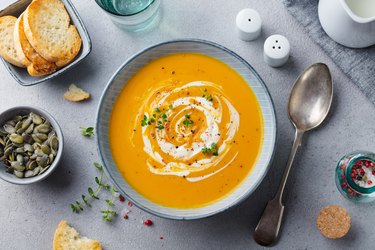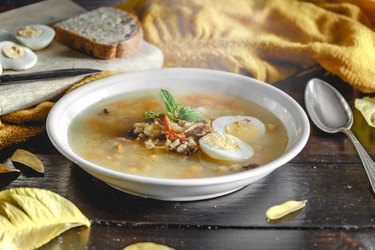
Yes, that's right — the soup diet really does work. Or at least the concept of a soup diet can yield legitimate weight loss.
Research shows soup is a helpful weight-loss food: It has the potential to be as satisfying as eating solid food, even though it's a liquid, per an older paper in Physiology & Behavior. And more recent research has found soup-eaters weigh less and have smaller waists compared to those who shun soup — these findings were published April 2014 in the British Journal of Nutrition.
Video of the Day
Video of the Day
Soup is soup, and so any soup diet should deliver the same benefits, right? Nope. Sorry.
There are some souping "mistakes" that can make this liquid lunch less than ideal if your goal is to lose weight.
Here are five things to watch out for.
Mistake 1: Always Choosing a Creamy Soup
Authentically creamy soups (not the "healthier" and "creamy" soups you've pinned on Pinterest) have a hefty dose of fat (and thus, calories) in them.
Sometimes creamy soups are made with a roux. "A roux is made using equal parts butter and typically, all-purpose flour," says Sara Haas, RDN, LDN, a dietitian and culinary nutritionist. "In addition to the fat in the butter, many of these recipes also call for finishing with cream or milk — those would also contribute to the fat content, too."
A single ounce of heavy cream has 102 calories, 97 of which are from fat, per the USDA.
How might you know if a soup contains cream or other high-fat dairy?
"Bisques and chowders are good indicators," says Haas. "So are 'cream of' or 'creamy.' Even ingredient identifiers can help: 'cheesy,' for example, or 'loaded'."
But really, you should read the ingredient list.
"Sometimes creamy soups don't contain cream at all! They're perhaps naturally creamy because they're blended with ingredients that become creamy once cooked and blended — think cauliflower, beans, etc.," Haas says. "Also, the cream is sometimes just a finishing touch, and as little as 1 tablespoon is added for that creamy mouthfeel."
All this isn't to say that you should never opt for a creamy soup. Just be sure to factor the added calories into your weight-loss plan.
Mistake 2: Only Eating Pureed Soups
Pureed soups deserve a spot in your diet, but they shouldn't be the only type of soup you eat.
First, it's not uncommon for pureed soups (think: tomato, potato, cauliflower) to include a little cream (go back to mistake #1 for more on that). But also, there's very little or sometimes absolutely zero chewing required when you consume a pureed soup.
Both chewing your food and eating a dish with a little textural variety can help boost the satiety factor of your meal and keep you feeling fuller longer, according to research published June 2018 in Appetite. In other words, a pureed soup may leave you searching in the snack cabinet not long after your meal.
Mistake 3: Thinking Soup Isn't a Breakfast Food

If breakfast-for-dinner is a legit thing, then dinner-for-breakfast should be, too. Enter soup for breakfast, folks.
These recipes will kickoff the new trend — and they each boast a healthy dose of fill-you-up protein!
Eating soup for breakfast also means starting your day off nutritiously: Regular soup-eaters have been found to have healthier diets compared to non-soup-eaters, per an April 2014 British Journal of Nutrition study. In that study, soup-eaters ate more protein, fiber and vitamins and minerals, and less fat compared to their counterparts who didn't consume soup. Buy soup-eaters also ate more sodium, which brings us to mistake #4.
Mistake 4: Eating Soup for Multiple Meals
Making most (or all) of your meals soup can really rack up the sodium in your diet — which only tangentially affects your waistline, but hear us out.
Soup is one of those foods that are typically sodium-laden — in part because some of its inherent ingredients are salty (think: cured meats, canned beans, broths and stocks).
But also, if you're mostly eating canned soup, know that those are often sodium-heavy. In fact, canned soup ranks fifth among the saltiest foods most Americans eat, according to the American Heart Association (AHA).
And as we all know, too much sodium is unhealthy: It can up your risk of high blood pressure, kidney stones and stomach cancer, and it's unhealthy for your heart, per the AHA.
Also, when we eat too much sodium, our body holds onto water and that can lead to puffiness, bloating and, yes, even weight gain.
Mistake 5: Selecting a Soup With Little to No Protein
Pumping up the protein in your weight-loss diet has its perks. For one, pairing a higher-protein diet (around 90 to 150 grams per day) with your low-calorie diet can help you shed more weight than if you were to eat only moderate amounts of protein, according to June 2015 research in The American Journal of Clinical Nutrition.
Other research outlined in that paper suggests protein could help you stick with your diet, and maybe not feel deprived, because it is such a satisfying nutrient.
So, go on, choose a soup like chicken noodle that's chock-full of protein, or go the plant-based route and simmer up a hearty lentil stew.
- American Heart Association: "Effects of Excess Sodium Infographic"
- American Heart Association: "The Salty Six Infographic"
- Appetite: "Influence of oral processing on appetite and food intake - A systematic review and meta-analysis"
- British Journal of Nutrition: "Soup consumption is associated with a lower dietary energy density and a better diet quality in US adults"
- FoodData Central: "Cream, heavy"
- Physiology & Behavior: "Soup and satiety"
- The American Journal of Clinical Nutrition: "Introduction to Protein Summit 2.0: continued exploration of the impact of high-quality protein on optimal health"
Was this article helpful?
150 Characters Max
0/150
Thank you for sharing!
Thank you for your feedback!